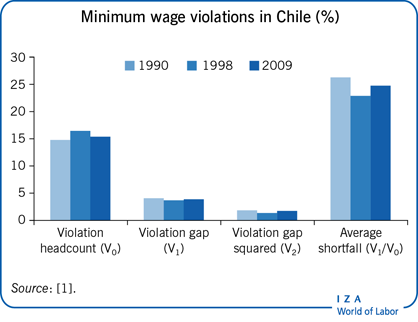Elevator pitch
Compliance with minimum wage laws and non-wage conditions of employment often depends on labor market specific factors. In developing countries, many workers still earn less than the legal minimum and lack access to mandated non-wage benefits. Enforcement has not kept up with regulation growth and compliance has not been measured from a multidimensional perspective. Such an approach would help to understand the impact of institutional variables and country-specific approaches on the level of labor law violation. The difference between de facto and de jure regulation remains particularly pertinent in countries where compliance is low.
Key findings
Pros
An index of minimum wage violation would allow decision-makers to analyze the level and depth of non-compliance and act accordingly.
Violation of non-wage labor laws in developing countries is high and often overlooked.
A multidimensional index of labor law violation is useful for providing more comprehensive data on non-compliance.
Despite limited enforcement there is evidence that employers do respond to wage regulations, although compliance remains partial.
Attention needs to be placed on de facto, rather than just de jure, labor market regulation.
Cons
If data on enforcement and compliance are scarce, finding appropriate measures for both is problematic.
Very high minimum wages and overly strict non-wage laws can lead to unemployment and other economic costs that compliance and enforcement reinforce.
A lack of skills and resources often limits enforcement practices.
Raising the number of inspectors will not necessarily raise compliance rates.
Enforcement in a severely resource-constrained environment is difficult when minimum wage and other labor regulations are complex.
